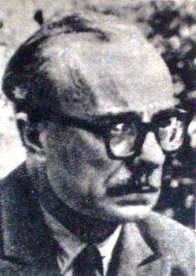A Quote by Ernesto Sabato
Just as the office worker dreams of murdering his hated boss and so is saved from really murdering him, so it is with the author; with his great dreams he helps his readers to survive, to avoid their worst intentions. And society, without realizing it respects and even exalts him, albeit with a kind of jealousy, fear and even repulsion, since few people want to discover the horrors that lurk in the depths of their souls. This is the highest mission of great literature, and there is no other.
Quote Topics
Albeit
Author
Avoid
Boss
Depths
Discover
Dreams
Even
Fear
Few
Few People
Great
Great Literature
Hated
Helps
Highest
Him
His
Horrors
Intentions
Jealousy
Just
Kind
Literature
Mission
Office
Office Work
Other
People
Readers
Realizing
Really
Repulsion
Respects
Saved
Since
Society
Souls
Survive
To Survive
Want
Without
Worker
Worst
Related Quotes
I love Leonardo DiCaprio. He just makes really great films with great directors. He has great relationships with directors but also has a great social awareness. I think he balances his work with his responsibilities to his world, the environment, things like that very well. I'm very impressed by him and I admire him a lot. And other actors like Joaquin Phoenix, I just look at him and marvel at his unexpectedness, just his work really.
Some souls think that the Holy Spirit is very far away, far, far, up above. Actually he is, we might say, the divine Person who is most closely present to the creature. He accompanies him everywhere. He penetrates him with himself. He calls him, he protects him. He makes of him his living temple. He defends him. He helps him. He guards him from all his enemies. He is closer to him than his own soul. All the good a soul accomplishes, it carries out under his inspiration, in his light, by his grace and his help.
Since the social victim has been oppressed by society, he comes to feel that his individual life will be improved more by changes in society than by his own initiative. Without realizing it, he makes society rather than himself the agent of change. The power he finds in his victimization may lead him to collective action against society, but it also encourages passivity within the sphere of his personal life.
He felt ... a suspicion-no, a conviction-than he had been abandoned, forgotten, and that no one in the whole world cared or would ever care enough about him to really find out what he was like and what his dreams were. He was an outcast, a creature somehow vastly different from all other people, an object of scorn and derision, an outsider, secretly loathed and ridiculed by everyone who met him, even by those few who professed to love him.
Where it is in his own interest, every organism may reasonably be expected to aid his fellows. Where he has no alternative, he submits to the yoke of communal servitude. Yet given a full chance to act in his own interest, nothing but expediency will restrain him from brutalizing, from maiming, from murdering his brother, his mate, his parent, or his child. Scratch an 'altruist' and watch a 'hypocrite' bleed.
Those who merely possess the goods of fortune may be haughty and insolent; . . . they try to imitate the great-souled man without being really like him, and only copy him in what they can, reproducing his contempt for others but not his virtuous conduct. For the great-souled man is justified in despising other people - his estimates are correct; but most proud men have no good ground for their pride.
Man is an Animal, formidable both from his Passions and his Reason; his Passions often urging him to great Evils, and his Reason furnishing Means to achieve them. To train this Animal, and make him amenable to Order; to inure him to a Sense of Justice and Virtue, to withhold him from ill Courses by Fear, and encourage him in his Duty by Hopes; in short, to fashion and model him for Society, hath been the Aim of civil and religious Institutions; and, in all Times, the Endeavour of good and wise Men. The aptest Method for attaining this End, hath been always judged a proper Education.
It is essential for the photographer to know the effect of his lenses. The lens is his eye, and it makes or ruins his pictures. A feeling for composition is a great asset. I think it is very much a matter of instinct. It can perhaps be developed, but I doubt if it can be learned. To achieve his best work, the young photographer must discover what really excites him visually. He must discover his own world.
Most of the world's great souls have been lonely. Loneliness seems to be one price the saint must pay for his saintliness... Always remember: you cannot carry a cross in company. Though a man were surrounded by a vast crowd, his cross is his alone and his carrying of it marks him as a man apart. Society has turned against him; otherwise he would have no cross. No one is a friend to the man with a cross.
When Heaven is about to confer a great office on a man, it first exercises his mind with suffering, and his sinews and bones with toil ; it exposes his body to hunger, and subjects him to extreme poverty ; it confounds his undertakings. By all these methods it stimulates his mind, hardens his nature, and supplies his incompetencies.







































